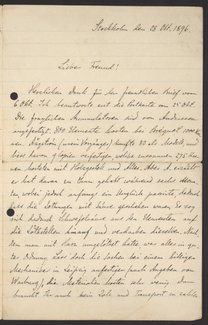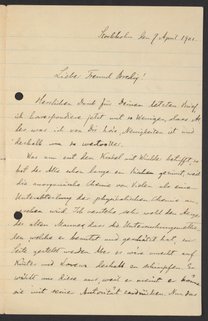Letter from Svante Arrhenius to Georg Bredig, January 1913
- 1913-Jan-01

Rights
Download all 3 images
PDFZIPof full-sized JPGsDownload selected image
Small JPG1200 x 1520px — 345 KBLarge JPG2880 x 3648px — 1.8 MBFull-sized JPG3690 x 4674px — 2.7 MBOriginal fileTIFF — 3690 x 4674px — 49.4 MBLetter from Svante Arrhenius (1859-1927) to Georg Bredig (1868-1944) containing personal and professional updates. Arrhenius praises Bredig for his interest in physical chemistry, discusses Wilhelm Ostwald's (1853-1932) work ethics, and explains his own struggle with writing and producing work in a second language.
He further shares his thoughts on mathematical physics and its reliability.
| Property | Value |
|---|---|
| Addressee | |
| Author | |
| Place of creation | |
| Format | |
| Genre | |
| Extent |
|
| Language | |
| Subject | |
| Rights | No Copyright - United States |
| Credit line |
|
| Additional credit |
|
| Digitization funder |
|
Institutional location
| Department | |
|---|---|
| Collection | |
| Series arrangement |
|
| Physical container |
|
View collection guide View in library catalog
Learn More
Related Items
Cite as
Arrhenius, Svante. “Letter from Svante Arrhenius to Georg Bredig, January 1913,” January 1, 1913. Papers of Georg and Max Bredig, Box 1, Folder 4. Science History Institute. Philadelphia. https://digital.sciencehistory.org/works/58vp7os.
This citation is automatically generated and may contain errors.
Image 1
Experimentalfältet 1 Jan 1913
Lieber alter Freund! [Bredig]
Ich danke Dir sehr für Deinen freundlichen Brief, der gestern Abend am Sylvesterabend, in meine Hände anlangte, als ich die letzten Studen des alten Jahres, mit Lesen der Litteratur zubrachte. Wir sassen hier ganz mutterseelenallein, ich und meine Frau und die Schwiegermutter, die nicht zufrieden war weil niemand hier ihr in die Kirche zufolgen die Zeit heute hat. Und vor allem war der kleine Sven da der wächst und wird klüger mit jedem Tag. Und der Regen schmetterte auf den Fenstern, so dass man sich doppelt behaglich in der schönen Stubenwärme fühlte. Sven ist besonders unsere grosse Freude. Und ich kann wohl dir erzählen, dass wir hoffen einen neuen Sprössling bis zur St Hans Zeit zu bekommen. Da verstehst Du vielleicht, dass ich nicht. Meinem älteren Sohn Olle geht es vorzüglich. Er wird im Frühling 1914 Student.
Image 2
[page 2]
Viele Verabredungen wegen Reisen mache; meine Frau kann doch nicht mitkommen und es wäre unrecht von mir von ihr und dem kleinen Sven unter solchen Umständen wegzureisen. Ich werde wohl im Sommer (spät.) zur British Association gehen um meine viele Freunde da zu sehen und dabei spreche ich bei unseren Freunden in Holland vor. Aber mehr Zeit darf ich kaum versetzen.
Es freut mich dass Du so vielseitig interessiert bist in den verschiedenen Zweigen der physikalischen Chemie. Es zeigt, dass du noch jung geblieben bist und Hoffnungen hast viele Probelem zur Lösung zu führen. Ich habe auch viele Interessen und möchte mich diesen hingeben – ich muss aber auch die alten pflegen dadurch dass ich Auflagen bereite, wenn die alten ausverkauft sind. Und es kostet mir die doppelte Arbeit wie einem der in der Muttersprache schreibt. Alles nimmt viel mehr Zeit und Nachdenken beim Verfassen, alles muss durchgesehen werden von einem, der die Sprache beherrscht und ich muss selbst alle
[page 3]
Korrekturen mit grosser Mühe lesen. Es ist dies was ganz anderes als was z.B. Ostwald der im Diktaphon spricht und alles andere vom einem Sekretär besorgen lässt, nur dass er einmal die Abschrift des Sekretärs durchsieht und etwas wegen Inadverteuren korrigiert. Ich sollte meinen, dass er in derselben Zeit zehn mal mehr als ich producieren kann. Ausserdem schreibt er etwa drei mal über dieselbe Sache, einmal in dem Annalen der Naturphilosophie oder in irgend einer Zeitung oder Fachblatt, dann in dem Sonntagpredigten und weiter in einem Buch, wobei es wörtlich abgehackt wird. Auf diese Weise produciert er mit demselben Aufwand von Energie etwa 30 mal so viel wie ich. Trotzdem ist er nervös und überanstrengt, aber das weil er sich auf ein Feld begeben hat wo die Leidenschaften herumtaumeln. Er will es so haben, weil er den Eindruck haben will dass er die Welt umwälzt. Ich bin sehr zufrieden, dass ich von dieser Neigung frei bin. Was die mathematische Blütezeit unter Planck Einstein u.s.w betrifft, verkralte ich mich etwas skeptisch.
Image 3
[page 4]
Planck ist neben Lorrentz der verehrenste und ich habe die grösste Achtung für seine Leistungen. Aber ich erinnere mich noch sehr gut der Zeit in welcher er uns half und wo er uns wirklich zu Nutzen war weil die Gegner für den matematischen Fetisch eine abergläubische Verehrung hatten. Nur halb hat er verstanden, wovon es Frage war, und als er uns und van’t Hoffs Ideen in halbdunksichtiges mathematisches Gewand eingekleidet hatte, machte er Prioritätsansprüche, von dessen ich ihn mit mildem Gewalt wegtreiben musste. Und er bewies die Wien’sche Formel, so lange diese als richtig angesehen wurde, als uber Rubens und Pringsheim eine andere Formel besser gefunden hatten, bewies er diesselbe mit Hilfe der “nächst wahrscheinlichsten Hypothese.” Jetzt ändert er fast kontinuierlich Meinung über die interessante Quantenfrage ebenso wie Einstein ueber die Relativitätsfrage. Das mathematische Instrument ist den Meisten unhändlich und liefert alle die Scheinprodukte bei unvorsichtige Manipulation. Also warte ich ab, bis etwas einigermassen zuverlässig von den mathematischen Physikern ausgegeben wird. Man denke auch an die Papierwissenschaft Duhems. Also lebe wohl, ein freudiges und erfolgreiches neues Jahr wuenschen ich und meine Frau Dir und den Deinigen. Dein treuer alter Svante Arrhenius
Image 1
The Fields for Experiments at the Royal Swedish Academy of Agriculture and Forestry,
1 January 1913
Dear old friend, [Bredig]
Thank you for your kind letter, which arrived yesterday evening on New Year’s Eve in the last hours of the old year as I was reading. We sat here completely alone, I, my wife, and mother-in-law, who was upset because no one would go to church with her. Above all, little Sven was here and is growing and becoming smarter with each passing day. The rain was pounding on the windows, which made us feel especially comfortable in the nice warmth of the room. Sven is our special pride and joy. Moreover, I can tell you that we are expecting a new baby in time for the feast of St. Hans. You may understand such things, but I do not. My older son, Olle, is doing exceptionally well. He will become a student in the spring of 1914.
Image 2
[page 2]
On account of travel, I have many appointments. Unfortunately, my wife cannot accompany me, and it would be wrong to leave her and little Sven under such circumstances. In late summer, I will go to the British Association to visit my various friends there and also drop in on our Dutch friends. However, I can hardly afford any more time.
I am pleased that you are so interested in the various branches of physical chemistry. It shows that you are still young and hopeful that many problems will be solved. I also have many interests and would like to devote more time to them. However, I also must keep up with my prior research and prepare new volumes when the older ones are sold out. Moreover, it takes me twice as long than someone who writes in their mother tongue. Everything takes a lot more time and thought while writing. Everything must be checked by someone who speaks the language and
[page 3]
I must diligently read all the corrections myself. This is completely different than what Ostwald does. For example, he speaks into a Dictaphone and has everything transcribed by a secretary. He only looks at the secretary’s copy once and corrects inadvertent mistakes. I sense that he can produce ten times as much as me in the same amount of time. In addition, he writes three times about the same topic: once in the Annals of Nature Philosophy, once in a newspaper or academic journal, and next in the Sunday sermon or a book, where everything is copied word for word. Thus, he produces about 30 times as much as me with the same amount of energy. Nevertheless, he is nervous and overworked because he has devoted himself to a field where ambition abounds. That’s the way he wants it because he wants to give the impression that he is revolutionizing the world. I am glad to be free on this inclination. As for the mathematical heyday under Planck, Einstein and so on, I am rather skeptical.
Image 3
[page 4]
Next to Lorentz, Planck is the most revered scholar and I have the greatest respect for his achievements. However, I still remember well when he helped us. He was really useful then because our opponents naively revered mathematics. He only partially understood what the question was, and when he disguised van’t Hoff's ideas in somewhat obscure mathematical terms, he made specific demands from which I had to assertively steer him away from. In addition, he concurred with Wien’s displacement law as long as it was considered correct. When Rubens and Pringsheim found another formula to be superior, he proved it with the help of the “next most probable hypothesis.” At the moment, he continuously changes his opinion about the interesting quantum question, just like Einstein does with the question of relativity. Mathematics is awkward for most people and produces false results in the event of careless manipulation. For this reason, I will wait until something reliable is published by the mathematical physicists. Duhem’s paper science is a good example. Farewell and my wife and I wish you and yours a happy and successful New Year! Yours Truly, Svante Arrhenius







